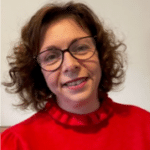Webinar Reflection: Leveraging Technology and Digital Advances to Develop Global Competencies in Teacher Educators and Candidates
This blog article is part of the Global Education Faculty PLC Professional Development Series, sponsored by the Longview Foundation. The writing series aims to elevate the perspectives of international scholars, including teacher educators, graduate students, and alike, to offer insights into how Educator Preparation Programs (EPPs) can integrate intercultural understanding within their programs. AACTE members interested in participating in the series should contact Brooke Evans at bevans@aacte.org.
On October 12, AACTE presented the webinar, Leveraging Technology and Digital Advances to Develop Global Competencies in Teacher Educators and Candidates. The moderator was Lin Wu (Western Oregon University), and the panelists were Michael Kopish (Ohio University), Iveta Silova (Arizona State University), and Yong Zhao (University of Kansas, University of Melbourne). Attendees learned ways technology can be used to develop global competencies for both teacher educators and their students.
In Scotland, we are in the process of reviewing our awarding of qualifications and assessments to improve educational outcomes. Interestingly, much of what was discussed by the three presenters in this webinar aligned with the Scottish (June 2023) report: “It’s Our Future — Independent Review of Qualifications & Assessment.”
Zhao spoke about the divisive nature of many education systems. His reference to the decline in reading age PISA scores is completely relevant and something that needs to be addressed. However, many educational systems can feel deflated by a decline in data, particularly when it is not tangible, not something seen in school at an interface-level when the socio-economic context (financial divide) is more visible and pertinent. Zhao takes cognizance of the divide, by indicating that we should be preparing children to “create our future” and “serve humanity.” He also refers to the wide spectrum of learners and abilities by stating that education systems have “limitations,” but we need to ensure that learners “achieve equally well but in different ways.” This perspective is outlined in the Scottish review under the chapter “Changing the Culture of Education in Scotland,” where the model of change supports that of integrity: Are we shaping our system to serve all stakeholders, or are we at a global competency level, not confident to acknowledge the systems and practices which require change?
Silova’s reflections on fear of change and the technologies we use to enhance this change are very applicable to global educational systems. The reflections also followed perfectly from Zhao’s play on the AI reversal: intelligent assistant. Are we using AI to assist us to thrive and enhance the global learning environment? Silva addresses this in her analysis of “contact zones” and areas of “interdependence.” It is clear from her play on existentialist thoughts on fear that we need to share ideas and devise clear workable processes. The focus on process links to Kopish’s “consume or create” analogy. If we share commonalities, we will be preparing children to create our future, not simply to take or leave the resources we each have in front of us, whether that be technological, theoretical, consumables, or interpersonal. Within the Scottish “It’s Our Future” report, assessment and the impact of AI on assessment investigates the “risk appetite.” This configures appropriately with Kopish’s analysis of being comfortable with uncertainty. Can we accept that things may go wrong as we re-think education beyond the classroom and the systems practiced?
The reflections by all three presenters were very intuitive and resonated with the mapping of the shift in systems and practices in Scotland. As educators, we need to see ourselves as part of global communities based on mutual support, trust, and respect to succeed.
To access the public webinar, Leveraging Technology and Digital Advances to Develop Global Competencies in Teacher Educators and Candidates, please visit aacte.org
 Angela Curley is a lecturer in education at the University of Glasgow in Glasgow, Scotland. She is also a doctoral candidate at Fairleigh Dickinson University and a member of the Longview Foundation-supported Global Education Faculty Professional Learning Community (PLC). She can be reached at angela.curley@glasgow.ac.uk.
Angela Curley is a lecturer in education at the University of Glasgow in Glasgow, Scotland. She is also a doctoral candidate at Fairleigh Dickinson University and a member of the Longview Foundation-supported Global Education Faculty Professional Learning Community (PLC). She can be reached at angela.curley@glasgow.ac.uk.
Tags: technology






